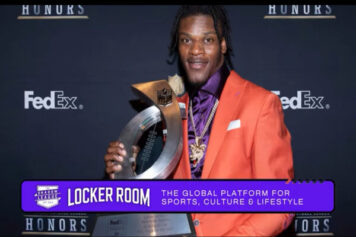(Twenty years after the release of Enter the Wu-Tang (36 Chambers), emeritus editor Vince Thomas got some friends to help him remember that landmark moment in time.)
Starting with A Tribe Called Quest’s “Scenario” featuring Leaders of the New School, the year of 1992 was about Dre & Crew out West and these extra-hype posse cuts coming out of New York City, at the time. Butsa Rhymes could’ve stopped rapping after closing out “Scenario,” and he’d probably still be a legend. Then you had a destructive track like EPMD’s “Head Banger” with Redman and K-Solo, which, to this day, sounds like nothing but sonic ill-intentions. By the end of ‘92 through early ‘93, Onyx dropped Bacdafuckup, and Black Moon was amped-to-death on “Who Got the Props.” It was New York City’s version of crunk music.
The Wu-Tang Clan’s “Protect Ya Neck” leaked into our lives during this climate. It was a song in a similar vein, but the sheer force of numbers made it remarkable. ALL THESE DUDES ARE DOOOOOOPE! Nine freaking emcees. And outside of RZA and GZA, we’d never heard of these dudes or their borough. But, who are any of us kidding? In the late spring of 1993, none of knew the Wu would become The Wu.
Twenty years ago, on the second Tuesday of November, Wu-Tang Clan dropped Enter the Wu-Tang (36 Chambers) and changed music and culture in ways both conspicuous and subtle – and most definitely lasting. However, it doesn’t feel right using this anniversary to take full stock of the Wu’s legacy. In many ways, I consider the four-year period between “Protect Ya Neck” and the release of the 36 Chambers follow-up Wu-Tang Forever in ’97 to be one long Wu-cycle. Given that the Clan dropped classic albums in ‘94 (Tical), ‘95 (Only Built for Cuban Linx, Liquid Swords, Return to the 36 Chambers) and ‘96 (Ironman) between their debut and victory lap, we’ll be spending the upcoming years revisiting and writing about all their individual master works. Why not just wait four years to really go deep and commemorate the Clan in an overarching way? As a group and as individual artists, they gradually arrived during those four years. You want to commemorate Wu on the anniversary of Forever – it’s only right.
That doesn’t mean that we should let a Big Bang moment like 36 come and go without proper appreciation, though. Surely you’ve stumbled upon your fair share of think pieces, oral histories and restrospects in the past few days. Here at TSL, I asked a few of my music head cronies to hit me with some quick thoughts to share on an album and group we all hold near and dear…
**********
J.R. GAMBLE (TSL staff writer): I remember it was 1993 and I was home from college for the summer. I was in a park in Bed Stuy, Brooklyn hanging with one of my classmates from there. We were standing around blowing chronic late at night with these three girls from the BX that also attended school with us in Virginia. That’s when my man's boy walked up. He had just hustled off his last pack and was good for the night. He came with a cassette tape and a portable radio bumping some crazy sounding hip-hop.
Son on the song was like, "M-E-T-H-O-D MAN, M-E-T-H-O-D MAN."
It was banging so gutter and hard and unique. The flow was coarse, but refined. And the delivery was banoodles.
We were immediately hooked. It was like we laced our Pitkin and Miller Ave. ganja, because listening to that maxi-single (with “Protect Ya Neck” on the other side) that night had me on a dirty, beautiful high like I had never experienced. That night we must have smoked four more blunts and listened to Meth's joint like 100 times, because by the time the sun came up and the crackheads and street walkers were turning in for the day, I was on my way to Phat Beats on Jamaic Ave. to cop single. I was at Sam Goody a few months later the moment 36 Chambers dropped.
ANDY KELLMAN (All Music Guide editor): In 1993, I was a high school senior with a part-time job at the Musicland in Ann Arbor's less popular mall. On Monday nights, I handled all the new releases — priced, security-tagged and, after closing time, stocked them for the next day. Several boxes received from BMG on November 8 contained at least 75 CDs and 30 cassettes of both 12 Play and Midnight Marauders. We had sold a few copies of the "Protect Ya Neck"/"Method Man" maxi single, so I was expecting maybe a dozen CDs and a few cassettes of 36 Chambers, too. Instead, Musicland HQ determined that we needed one cassette and zero CDs.
Upon release, demand was not great. I do remember, however, strolling past the international section that week and being asked by a fellow employee, as he stood beside a smirking regular customer, where we stocked "the Who-Tang Clan." I also recall a rare steady upswing. Throughout the following year, we must have sold several hundred copies of 36 Chambers, including at least one to James "Lights Out" Toney. It certainly out-sold Midnight Marauders in our store. On a more personal level, no album made the stock system on my lousy '86 Mustang sound less embarrassing.
TRAVIS LARRIER (TSL music contributor): Along with Biggie and Mobb Deep, Wu-Tang Clan formed the holy trinity of the soundtrack to my high school years. Biggie had the flash, the Mobb had the posturing, but the Wu were the avant garde. 36 Chambers was their opening salvo.
At the time, we didn’t know that the record would spawn more classic albums that would exceed the sparse yet landmark foundation it laid. What we did know was that the music on 36 was unlike anything we had heard. Biggie was sampling Mtume – that sounded familiar. Q-Tip was the behind-the-scenes brains for The Infamous – so, in a way, that sounded familiar. But no one was repurposing old Stax records to sound like mini horror flicks. Most people in my school knew the lyrics to the album verbatim within weeks. The Wu is my generation's Funkadelic and Rolling Stones all in one, and like those bands, they will be here forever.
ANTHONY KNIGHT (TSL music contributor): In 2004' s Never Scared, Chris Rock made this assertion about the impossibility of finding a soulmate: “You're never gonna get a soul mate. You're never gonna meet the perfect person. You're never going to meet someone that loves Seinfeld and the Wu-Tang Clan.”
While Chris' overall point isn't lost on me, I have to disagree with the example.
Honestly, this statement probably only describes three categories of people within Generations X and Y. 1) A Wu fan that has never given Seinfeld an honest watch, 2) a Seinfeld fan that has never given the Wu an honest listen, or, 3) someone that has never seen or heard either.
36 Chambers combines the philosophies of martial arts, supreme mathematics, criminology, and hip-hop. The group itself is almost schizophrenic; a delicate blend of nine (10, really) uniquely diverging personalities. Musically, the RZA created a hip-hop album that is as boom bap as it is soul as it is blues as it is rock. The lyrics heard on this album are the debuts of nine unique emcee styles.
When 36 dropped, I felt the album was made for me – a 14-year-old hardcore hip-hop fan. But so did the street hustler, and the kid that was into karate flicks and the suburbanite collecting bruises in the mosh pit. The album is comical and crisp, yet so dirty and horrific. It is the most accessible, inaccessible hop music…possibly ever. Remarkably, 36 is a niche album, with that niche consisting of everyone. I mean, honestly, don't you Wu fans love Seinfeld?



